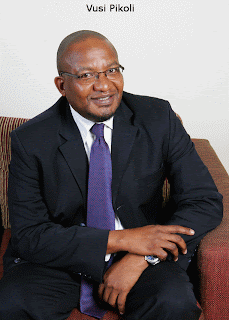Quote of the week
[T]he moral point of the matter is never reached by calling what happened by the name of ‘genocide’ or by counting the many millions of victims: extermination of whole peoples had happened before in antiquity, as well as in modern colonization. It is reached only when we realize this happened within the frame of a legal order and that the cornerstone of this ‘new law’ consisted of the command ‘Thou shall kill,’ not thy enemy but innocent people who were not even potentially dangerous, and not for any reason of necessity but, on the contrary, even against all military and other utilitarian calculations. … And these deeds were not committed by outlaws, monsters, or raving sadists, but by the most respected members of respectable society.
Eichmann in Jerusalem: A Report on The Banality of Evil
President Mbeki owes us an explanation
The suspension by President Thabo Mbeki of Vusi Pikoli, the National Director of Public Prosecutions (NDPP), is a potentially earth-shattering event for our democracy. In the present political climate in which suspicions thrive and every action by the President will rightly or wrongly be viewed as a move in the ongoing succession battle, the Presidential interference in the administration of justice must be deeply worrying.
The Prosecuting Authority is a creature of the Constitution, which requires that it exercises its functions “without fear, favour or prejudice”. In other words, it is consti tutionally bound to act independently and not to show any political or other bias in its day-to-day work.
tutionally bound to act independently and not to show any political or other bias in its day-to-day work.
However, this constitutional independence is not absolute. The National Director must formulate a prosecuting policy in concurrence with the Minister of Justice and the Minister also exercises final authority over the prosecuting authority. This means that the prosecuting authority must set policy guidelines in accordance with the policy positions of the government of the day, but must otherwise operate free from interference by either the Minister or the President.
In the event that either the Minister or the President is not happy with the decisions taken by the National Director, or where they fight and disagree with him, neither of them have the legal right to fire him. He is entitled to tell them to go to hell if he wants to.
This is clear from the National Prosecuting Authority Act of 1998, which limits the power of the President provisionally to suspend the National Director or to remove him from office. The President can only remove the National Director from office for:
- misconduct;
- on account of ill health;
- on account of incapacity;
- or on account of the fact that he is no longer a fit and proper person.
The clear implication is therefore that the President can only suspend the National Director if he has a reasonable suspicion that one of the factors set out above are present. The President then has to institute an inquiry aimed at establishing the existence of at least one of the objective facts set out above. Parliament must then endorse the existence of one of these factors and approve the removal from office before it can become final.
It is therefore deeply troubling that the statement issued by the Presidency makes no mention of incapacity, ill health or misconduct, but merely claims that there has been an irretrievable breakdown in the working relationship between the National Director and the Minister of Justice and Constitutional Development, Brigitte Mabandla.
The law makes clear that President Mbeki cannot fire Mr. Pikoli because of such a breakdown of trust. Morever, to fire Mr. Pikoli because he is not “fit and proper person” – also used in the Constitution as one of the reasons for impeaching a judge – would be difficult to do because the term has a restrictive meaning and suggest at least that the person targeted has done something illegal or extremely dishonest.
This means the only possible reason for the suspension and the possible firing of Mr. Pikoli is that he has been guilty of misconduct. For this to stick legally, the President will have to show that Mr. Pikoli had failed to follow the provisions of the enabling act and had, for example, failed to furnish the Minister with information about the exercise of his powers as required by section 33 of the Act.
In the absence of such proof we would be entitled to think that the President has overstepped his legal powers and has interfered with the administration of justice for political reasons. If it is correct that the President wants to fire Mr. Pikoli because the latter has not co-operated with the police to allow the Scorpions to report to the Minister of Safety and Security, Mr Mbeki might not have a legal leg to stand on.
This is because the National Prosecuting Authority Act has not yet been amended and there is therefore no legal duty on Mr. Pikoli to obey instructions to deal differently with the Scorpions as there is no legal basis for such an instruction. As an independent institution the prosecuting authority should not take instructions from the President, the Minister of the Commissioner of Police.
The statement from the Presidency suggests that the President and the Minster do not understand or support this important constitutional principle and believe that Mr. Pikoli has a duty to take orders from them. This is unfortunate as it creates the impression that the President and the Minister is interfering in, and thus undermining, the administration of justice in this country.
In any event, the cryptic announcement of the Presidency leaves open more questions than answers. The President owes it to the country to take us into his confidence and tell us the real reason for the suspension.


